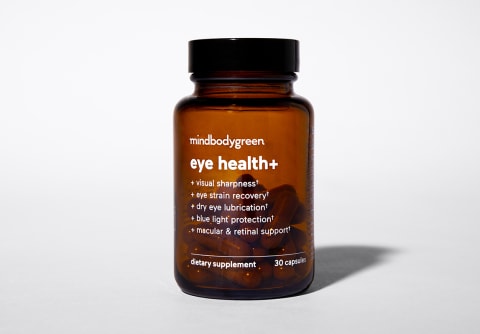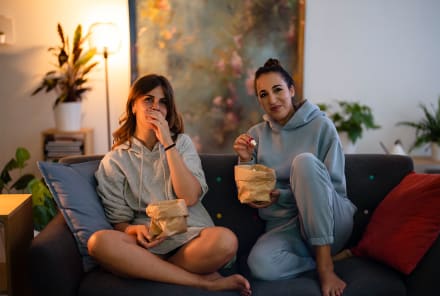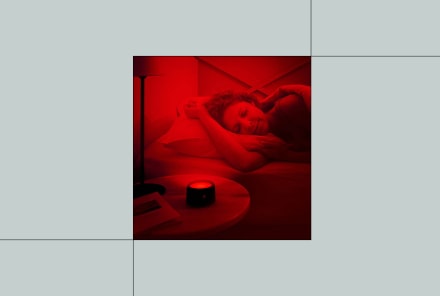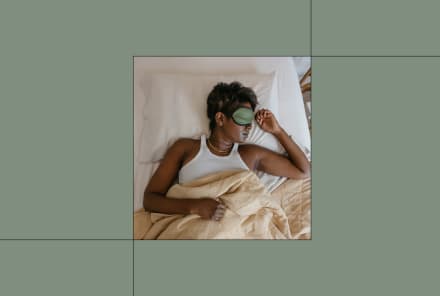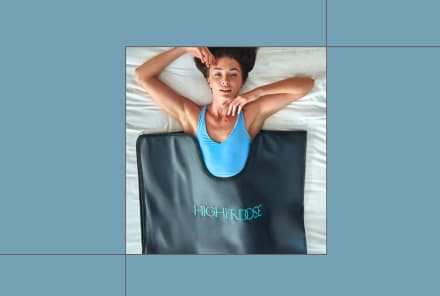Advertisement
How Blue Light Is Affecting Your Eye Health, Sleep Schedule & More


Ashley Jordan Ferira, Ph.D., RDN is Vice President of Scientific Affairs at mindbodygreen. She received her bachelor's degree in Biological Basis of Behavior from the University of Pennsylvania and Ph.D. in Foods and Nutrition from the University of Georgia.

It's undeniable that we're spending more and more time stuck to screens. Our work, our leisure, our connection—just about every area of our lives seems to be on screens these days.
Apart from distracting us from full engagement in the here and now, excessive screen time also exposes us to sleep's most prevalent digital foe: blue light.
Blue light doesn't just come from our screens, though. The truth is, this high-energy light is everywhere, and your eyes need protection 24/7—not just leading up to bedtime.
What is blue light, exactly?
Blue light is part of the visible light spectrum and makes up the wavelengths between 415 and 455 nanometers. Unsurprisingly, this light is literally blue, but the way it affects our eyes is arguably more interesting than its color.
According to optometrist Jeff Anshel, O.D., FAAO, blue light is the highest energy light that reaches the retina and also allows for high oxidation potential. Blue light passes through the cornea and lens, forcing the retina (the light-sensitive layer at the back of the eye) to process and deal with it.
A 2018 scientific review1 from the International Journal of Ophthalmology explains that as blue light passes through the cornea, lens, and retina, it affects each to a different degree, allowing for varying levels of oxidative stress.
"Since our eyes are one of the most metabolically active organs in the body, they are not only susceptible to oxidative stress, they are more vulnerable," shares mbg's vice president of scientific affairs Ashley Jordan Ferira, Ph.D., RDN.
Benefits of blue light.
Despite what you may have learned from the wellness world's new obsession with blue light (and from my description of blue light above), not all blue light is bad. In fact, it's critical for our health and well-being in some ways.
The biggest source of blue light is actually the sun, and exposure to this natural light is essential to regulate our circadian rhythm (the body's natural sleep and wake cycle). Exposure to the sun's blue light in the morning increases our cortisol levels and helps us wake up. It also boosts alertness, helps memory and cognitive function, and elevates mood, shares Anshel.
If you've ever experienced a lower mood or struggled with your ability to focus in the winter—i.e., when the days are shorter and we spend less time in the sunlight—then you've felt the need for blue light firsthand. In fact, some have even found that using sun lamps with artificial blue light can help remedy their wintertime woes.
As with most things in life, the biggest concern with blue light is finding balance and avoiding too much cumulative exposure.
Potential negative effects of blue light.
According to Anshel, too much blue light exposure, or exposure at the wrong time, can contribute to a disruption to your circadian rhythm, difficulty focusing, and more. (I definitely experience these concerns from time to time, and I know I'm not alone.)
Research scientist Deshanie Rai, Ph.D., FACN, vice president of scientific and regulatory affairs at OmniActive Health Technologies, says that too much blue light exposure can also result in digital eye strain and eye fatigue. "This is because of the nature of blue light—it scatters more easily than other light," she explains. "It reduces contrast, and therefore, the eyes must work harder to see the fine details."
With device use having significantly increased2 since the start of the pandemic, we need to be aware of the effects of blue light now more than ever.
Where and when are we exposed to blue light?
If much of the blue light we are exposed to is from the sun, then why are we so worried about it? After all, you do hear us preaching about the benefits of vitamin D and time in nature. What could be so bad about this "natural" thing?
The reality is that the level of blue light bombardment our eyes experience on a daily basis is anything but natural. While we do need to get some blue light from the sun to help regulate our circadian rhythm, our eyes simply aren't designed for the sheer amount of blue light exposure that's common today. From digital screens to fluorescent and LED lights, our eyes hardly catch a break and many of us are experiencing blue light burnout.
Increased screen times, especially before bed, can negatively affect our sleep cycles. Not to mention the digital eye strain, eye fatigue, and eye dryness that come with excessive screen time. When push comes to shove, it's clear that screens are counterproductive to our overall eye health.
"We have a nation of tired and strained eyes, but it's largely a silent issue (until it's not). That's why proactive consciousness of these issues and eye care measures that nurture this precious organ are paramount," says Ferira.
How can we protect our eyes from blue light?
Before you get too concerned about your screen use, let's take a look at some ways you can protect your eyes so blue light burnout never has to be on your radar.
Try blue light glasses.
One of the newest health accessory crazes, blue light glasses (aka blue light blockers) help control the temperature of light from your television, phone, or laptop.
Functional medicine physician Leland Stillman, M.D., recommends testing to see if your blue-light blockers block out the hue completely. For example, you shouldn't be able to see the flashing blue light of a police car if your glasses are working right. Try looking for glasses that have orange or red lenses.
Increase your intake of key nutrients that filter blue light.
Perhaps the most important way you can support your eye health is by utilizing science-backed nutrition strategies to protect them from blue light.
There are two phytonutrients that top that list of strategies. Macular carotenoids lutein and zeaxanthin act as "internal sunglasses" to help filter blue light and deliver photoprotection: "Blue light glasses are minimally protective; the best protection is to consume lutein and zeaxanthin,"* says Anshel.
These macular pigments protect the eye from blue light and support the function of the macula.* The macular pigment optical density, or MPOD, is a measure of lutein and zeaxanthin levels specific to the eye.
"As it turns out, there are over 600 of these phenomenal carotenoid plant bioactives, but get this: Only two are known to be preferentially deposited and concentrated in your macula, that centermost part of your retina that's required for everything from color and central vision to discerning fine details," Ferira previously shared.
"If we don't have adequate macular pigment levels to filter out the blue light, it causes oxidative stress," Rai explains, noting that this can "ultimately result in structural and functional alterations within the eye," which isn't ideal for vision longevity.
According to a 2016 randomized controlled trial published in Experimental Eye Research, daily supplementation with lutein and zeaxanthin carotenoids has clearly been shown to increase3 MPOD.* "MPOD is not only a measure of regular carotenoid intake and nutritional status but is also a physiological measure, or proof, of light-filtering 'power' from these botanical bioactives," explains Ferira.
Additionally, the intrinsic and potent antioxidant properties4 of these unique xanthophyll carotenoids are beneficial in fighting oxidative stress caused by blue light and protecting the central retina.*
"While this duo of macular carotenoid superstars is found in certain plants (think leafy greens and some fruits), our nation is underconsuming them," shares Ferira. In addition to eating more of these nutrient-dense foods, you'll reap the benefits of concentrated daily doses of lutein and zeaxanthin in targeted supplements.
Designed with visual performance in this modern, digital age in mind, a high-quality and comprehensive eye supplement like mbg's eye health+ can help give your eyes the specialized daily care they crave.*
In this wholly plant-powered vegan formula, eye health+ combines full-potency (and clinically researched) doses of lutein and zeaxanthin alongside other eye health superheroes astaxanthin (a powerful carotenoid working in the front of the eyes), Patagonian maqui berry, and saffron flower extract to combat digital eye strain, blue light, oxidative stress, eye dryness, and more.* (Did we mention that was all in just one daily capsule?)
Reduce blue light exposure.
Of course, limiting our exposure to blue light is one of the best ways to prevent blue light burnout. Try making your bedroom a device-free, blue-light-free zone with warm-colored light bulbs—and no scrolling before bed! After all, sleep is sacred (and health central).
If the thought of committing to a device-free bedtime routine doesn't sound feasible, rest assured that many of our devices are adjusting to the demand for less blue light exposure.
There's a "night mode" on phones and apps for laptops that adjust to your sleep schedule. (For example, I've used f.lux for over seven years to make sure my late-night article writing and doses of Netflix before bed don't affect my sleep.)
Another way to ensure an extra level of protection is to exercise good habits around screen use—like applying the "20-20-20 Rule," a daily eye care ritual that optometrist Anshel personally developed and recommends to all of his clients. It goes like this: After 20 minutes of looking at a screen, focus on something 20 feet away for 20 seconds. Implementing this break after staring at a screen for extended periods of time promotes vision longevity and prevents blue light burnout.
The takeaway.
Your eyes aren't simply meant to be exposed to blue light all day, every day. They need your help to provide sufficient protection from too much exposure. "Let's be smart about visual longevity—and thus, kind to our eyes," encourages Ferira.
Wearing blue light glasses and avoiding screens are some helpful strategies to protect your light-sensitive eyes. But the best way to help out your eyes, by far, is to support their longevity by providing the vision-supporting nutrients they need daily (sooner rather than later).
Taking a premium vision health and longevity supplement like mbg's eye health+ that's loaded with clinically researched plant bioactives—including eye-critical carotenoids—can help your eyes develop their own pair of metaphorical internal sunglasses so you're prepared to fight blue light anytime, anywhere.*
Watch Next
Enjoy some of our favorite clips from classes
Enjoy some of our favorite clips from classes
What Is Meditation?
Mindfulness/Spirituality | Light Watkins
Box Breathing
Mindfulness/Spirituality | Gwen Dittmar
What Breathwork Can Address
Mindfulness/Spirituality | Gwen Dittmar
The 8 Limbs of Yoga - What is Asana?
Yoga | Caley Alyssa
Two Standing Postures to Open Up Tight Hips
Yoga | Caley Alyssa
How Plants Can Optimize Athletic Performance
Nutrition | Rich Roll
What to Eat Before a Workout
Nutrition | Rich Roll
How Ayurveda Helps Us Navigate Modern Life
Nutrition | Sahara Rose
Messages About Love & Relationships
Love & Relationships | Esther Perel
Love Languages
Love & Relationships | Esther Perel
What Is Meditation?
Box Breathing
What Breathwork Can Address
The 8 Limbs of Yoga - What is Asana?
Two Standing Postures to Open Up Tight Hips
How Plants Can Optimize Athletic Performance
What to Eat Before a Workout
How Ayurveda Helps Us Navigate Modern Life
Messages About Love & Relationships
Love Languages
Advertisement
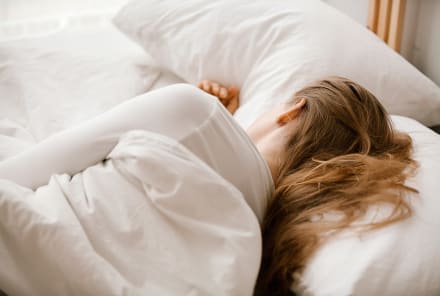
This Little-Known Supplement Helps Women Sleep & Decreases Signs Of Depression
Molly Knudsen, M.S., RDN

This Little-Known Supplement Helps Women Sleep & Decreases Signs Of Depression
Molly Knudsen, M.S., RDN
